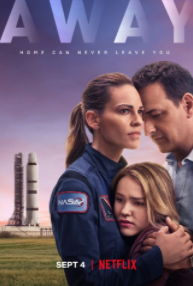by new contributor Christopher James
 What role does space play in our current world? Today, getting on a plane during COVID almost feels as risky as embarking on a mission to Mars.
What role does space play in our current world? Today, getting on a plane during COVID almost feels as risky as embarking on a mission to Mars.
Netflix’s new bright, shiny and expensive looking drama, Away, tries to contextualize space travel in its pilot episode. At a press conference, a reporter asks the Atlas crew, “Why should we care more about Mars than our own planet.” Hilary Swank’s commanding officer, Emma Green, delivers an impassioned speech on how much the US spends on the military and war. Wouldn’t it be better if we repurpose these tools for “discovery, not destruction.” This sets the stage for an exciting space mission where traveling to Mars could possibly save us from ourselves. Unfortunately, Away dodges this interesting, if thornier, premise as if it were a meteor heading straight for its shift. Rather than take a risk, it heads into safer territory, being a digestible family drama...

The Atlas journey represents a global effort to get a crew of humans to set foot on Mars. Aside from Emma, the crew includes Misha Popov (Mark Ivanir) of Russia as the weathered space traveler, Lu Wang (Vivian Wu) of China as chief scientist, Dr. Kwesi Weisberg-Abban (Ato Essandoh) of the U.K. as the botanist, and Ram Arya (Ray Panthaki) of India as medic. With each being an expert in their fields, their faith in Emma as a leader is tested early when she makes an impulsive decision that jeopardizes the mission.
Any true Film Experience fan is asking the same question: How is The Swank? Truthfully, Hilary Swank finds her sweet spot here. She settles into the meeting point between drive and regret rather nicely. Emma is thrilled to be leading this team of astronauts to Mars, but can’t help but look back at all that she’s leaving behind. Even with ample cause to turn back, she perseveres. This isn’t the first time that Emma has warred with choosing her family or her career and it won’t be her last.
So what is Emma leaving behind? Her husband, Matt (Josh Charles) is a NASA engineer who is nothing but encouraging. Meanwhile, her daughter, Alexis (Talitha Eliana Bateman) is equally loving and well-behaved. However, once Emma takes off, Matt suffers a stroke from a pre-existing condition. Overnight, Alexis graduates from only child to sole family caretaker. Both actors create a believable and nuanced father-daughter relationship. Their unbridled love grounds them, even when momentary strains arrive.

Swank does more to convey the stakes of every episode than any of the writing or directing. Even when she’s interacting with her crew, you find her mind drifting back to her home. That’s not to say she doesn’t baldly vocalize her feelings. “They told me I’d miss things, but it's so much harder than I would imagine,” she delivers to her therapist/the audience seven episode in to make sure we really get it. Yet, we the audience don’t feel the same separation. Dramatically, it’s incredibly unsatisfying that Emma is able to hop on the phone to call her family from space with the same level of difficulty it takes to make a long distance call. She complains that she misses her family. Yet, she’s also involved enough on a day-to-day basis to know her daughter’s report card front to back.
Away is at its strongest when it straws away from our central nuclear family. Each of the other crew members get an episode to share their backstory, in almost the exact format of Orange is the New Black. Suddenly a flippant comment from Emma triggers a flashback that starts the “episode of the week” for a new character. Vivan Wu excels in her role as Lu once she’s given the spotlight. Lu harbors a private love that isolates her from both her crew and country. Wu beautifully conveys Lu’s devotion to her country, even if it forces her to suppress her desires.

Another standout is Ato Essandoh as Kwesi, whose faith unfurls an interesting upbringing story. Adopted from Ghana at a young age, Kwesi integrates himself into his new mixed race home through learning Judaism. His interest in botany is intrinsically linked to his faith and his two sets of parents. These backstories make each of the crew members more complex and lovable. So why do we keep leaving them to go to Earth?
Though Away is created by Andrew Hinderaker and from showrunner Jessica Goldberg, it bears the fingerprints of its executive producer, Jason Katims. The Parenthood and Friday Night Lights creator has done fantastic work etching the fault lines in strong foundations like family or football communities. Even though Away takes us from Earth to Mars, it seems more interested in the everyday family drama of being separated from the ones you love. In the right show, this would make for an engrossing tearjerker. Unfortunately, every beat lands with a resounding shrug. Away gives the same weight to Alexis’ "C" in school as Emma’s near death situations. Each episode is so evenly paced, one might mistake it for a flatline.
It is neither exciting enough to be a thrill ride, nor emotional enough to be a tearjerker. Away commits the most cardinal sin of television in 2020… it’s boring. C+